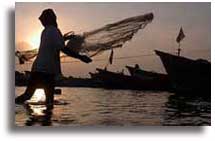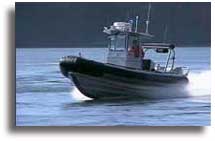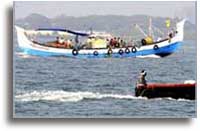FISHERIES
Introduction to the Career
Fisheries, as the name suggests is an organized effort which is related to the capturing of fish including inland and sea or other aquatic species. This industry involves catching, processing, marketing and conservation of fish. Fisheries Science is an academic discipline of managing and understanding fisheries. This is a multidisciplinary subject that includes the biological study of life, habits and breeding of various species of fish. It also involves farming and husbandry of important fishes and aquatic organisms in fresh water, brackish water and any marine environment. Fisheries, is a term related with the capture of fisheries including inland and sea, aquaculture, gears, navigation, oceanography, aquarium management, breeding, processing, export and import of seafood, special products and by-products , research and related activities. The contribution of fisheries to the GDP is around 1.4% and GDP contribution of agriculture sector as a whole is at 4.6%.
Fish is the primary source of protein for over one million people in the world. Fishing is also the main source of income for over 100 million people who are directly involved in fishing. In India, it is estimated that around 8 million people directly or indirectly depend on the fisheries sector. India is the fourth largest producer of fish in the world. It is also the second largest producer of inland fish. Development of brackish water and freshwater aquaculture has tremendous scope in India. Out of a total area available for culture, only 30% of fresh water area and 10% of Brackish water area is utilized. Fisheries aims at developing and maintaining sea wealth.
Fisheries is estimated to provide 16% of the world population's protein and India holds the seventh position in the world as regards to the value of fish exports. Around 8 million people of India are directly or indirectly dependent on the fisheries sector. The rapidly developing fishery industry, provides employment not only to the traditional fishermen, but also to the highly skilled personnel engaged in the scientific breeding and management of fisheries. The scope in the field of fishery science is increasing with the development of brackish water and freshwater aquaculture. Because of the country's expansive natural resources, dynamic entrepreneurial skills, this profession is advantageous to the Indian economy also.
Nature of Work and Job Description

The main objective of fisheries science is to make available the much needed technically competent extension personnel for transfer of technology. It helps a person to assist the research and development,to develop and execute fisheries development plan. Admission to various branches of Fisheries Science are available at State Agricultural Universities.
Qualification
To become a fisheries graduate one has to pass 4 year degree from Fisheries Colleges of State Agricultural Universities. For admission in B. F. Sc (Bachelor of Fisheries Science) course one can apply after 10 (+) 2 having PCB group. Admission is given as per merit of candidates and availability of seats. Special quota for outside state candidates is allowed to the candidates who have passed entrance exam of ICAR and are getting-fellowship too.Special reserved seats are there for Jammu and Kashmir, Mizoram, Arunachal Pradesh and Nagaland.

Course Areas

Personal Skills
Those who have taken fishery science as a career must possess a genuine interest in marine life and should be free from sea sickness. The field requires a lot of research work and one should have research oriented mentality. Dedication to work, devotion, hard working nature, patience, a curious and inquisitive mind are essential. Quick thinking and the ability to come up with new ideas are advantageous. A good managerial skill is also required, as fishery science is a field which is directly or indirectly related to business.
Job Opportunities for Fisheries Graduates:
State Government: in every state in the country, the government has a fisheries department in which fisheries graduate can apply for the post of Assistant Fisheries Development Officer (AFDO)/ Fisheries Extension Officer (FEO) and District Fisheries Development Officer.
Central Government: One can get job in central agencies like Marine Product Export Development Authority (MPEDA), Fisheries Survey of India (FSI), NIO, WHO, FAO, NACA, NABARD, EIA.
Academic Institutes: Candidates having completed degree (B. F. Sc) can apply for the post of Research Assistant, Biochemist, Biologist, Technicians, etc. Candidates having Postgraduate (M. F. Sc) can apply for the post of Assistant Professor in the Faculty of Fisheries under ICAR. ASRB conducts an All India Competitive Exam, Agricultural Research Service (ARS) followed by viva voce.
National Banks: Fisheries graduates can get jobs as a field officer, managers in agriculture loan section in nationalized as well as private banks.
Self Employment: As an entrepreneur, after completing the professional degree in B. F.Sc candidate can start their own enterprise. The financial support can be obtained through NABARD or through other nationalized banks. The main area in which fisheries enterprise can be developed are: feed manufacturing, feed sales, ornamental fish culture and breeding, aquaculture, hatchery and seed production, commercial pearl production, fish processing and marketing, net making, fish disease diagnostic centre, consultancy services and establishment of agri-clinics.
Private Sector: Candidates can work as a manager or officer in seafood processing and export units, aqua feed plants, fishing gear industries and in pharmaceutical companies. There is great paucity of skilled manpower in the area of designing, construction, management of fish farms and hatcheries.
Fishing / Ocean: The increasing demand for sea food, sea based medicines and grooming of eco-friendly industries is likely to create a huge demand for oceanographers. Fishing is one of the areas in fishery sector. Participating in deep sea exploration has tremendous scope. Government and World Bank have been supporting to develop fishing industry by Assistance in terms of subsidies and finance.
Foreign Jobs: Apart from scope for higher education in fisheries in countries such as USA, Canada, Australia, Japan, China and European countries, there are demands for fisheries professional in the aquaculture and processing sectors in Gulf and African countries also. There are a number of fisheries graduates doing business in foreign countries in field of aquaculture, export and import.
Remuneration
Remunerations in this field vary widely, depending on the area of specialization chosen. In the private sector one may start with an initial salary range of Rs 6,000-8,000 per month. But in the government sectors, the salary range may be different but it offers stability. In this field, research positions are more lucrative but these are usually reserved for doctorate holders with experience.
Useful Contacts
- Indian Council of Agricultural Research (ICAR), Address : Krishi Bhavan, Dr. Rajendra Prasad Road, New Delhi-110 001 Website : www.icar.org.in
- Central Institute of Fisheries Education (CIFE), Address : Fisheries University Road, Seven Bungalows, Andheri (W), Mumbai – 400061 Branches : Kolkata, Lucknow, Haryana and Kakinada Phone : +91 22 2636 1446 / 7 / Fax : +91 22 2636 1573 website : www.cife.edu.in
Institutions working in the field of fisheries:
Fisheries |
The institutes offering degree and higher education also include ICAR and Krishi Vigyan Kendras .Training Centers at CIFA, CMFRI and CICFRI, state government introduced fisheries as a vocational course at 10 (+)2 level with active assistance from NCERT in regard to developing circular and books. Also there are coastal states having fisheries schools at fishermen dominating villages.
Experts Opinion
Fisheries in India, though very under-developed, contributes annually a substantial revenue to the national income. Rich in proteins, vitamins and mineral salts, fish is a valuable protective food. It forms as a very important constituent of the diet over considerable areas. The, development of fisheries is, therefore, one of the most promising means of improving the diet of the people.
